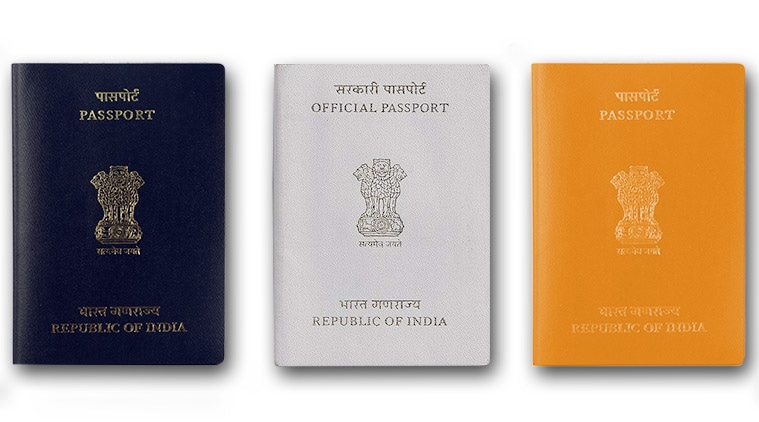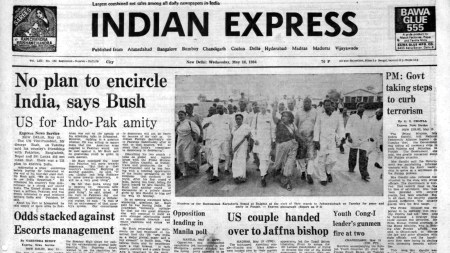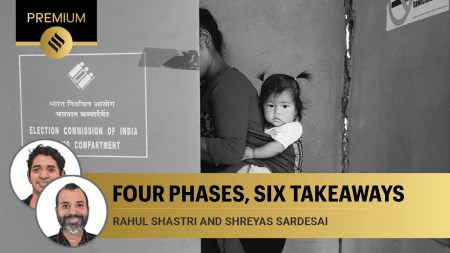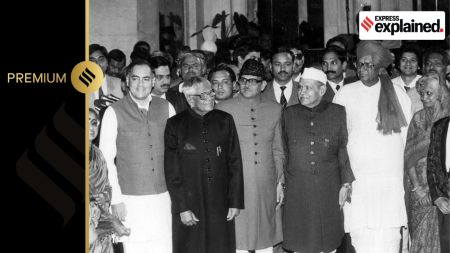- India
- International
Explained: What’s behind the change of colour, trimmed information in new Indian passports
The government has decided to not print the last page of the passport, which contains information like the name of the passport holder’s father, mother or spouse, address, Emigration Check Required (ECR) and any old passport number with the date and place of issue.
 Existing passports continue to remain valid till the date of expiry in the passport booklet.
Existing passports continue to remain valid till the date of expiry in the passport booklet.
On Friday, the Ministry of External Affairs announced it would end printing family and address information in passports and offer a new jacket colour, based on an emigration check requirement status.
What changes has the government decided to bring to the Indian passport?
The government has decided to not print the last page of the passport, which contains information like the name of the passport holder’s father, mother or spouse, address, Emigration Check Required (ECR) and any old passport number with the date and place of issue. As the passport’s last page will not be printed now, passport holders with an ECR status would be issued a passport with an orange-coloured jacket. Those with non-ECR status will continue to get blue passports.
Why did the government decide to do this?
The government accepted the recommendation of a three-member committee comprising officials of the Ministry of External Affairs (MEA) and the Ministry of Women and Child Development, seeking to examine various issues pertaining to passport applications, such as instances where a mother/child had insisted that the name of the father should not be mentioned in the passport, and passport issues relating to children with single parents and adopted children.
Also Read | Passports may come without information on the last page

Consequent to that, the government is doing away with the printing of information contained in the passport booklet such as the name of the father/legal guardian, the mother, spouse and an address, contained in the last page of the passport.
By when will this be implemented?
No specific date for its implementation has been given as the Indian Security Press (ISP), Nasik, would be designing the new passport booklets in due course. Till such time as the new booklets are designed, manufactured and made available to the MEA, passports will continue to be printed with the last page. Existing passports continue to remain valid till the date of expiry in the passport booklet.
What types of passports are currently issued by the government?
Three types of passports are issued by the government:
(a) Regular Passport — this has a navy blue cover; it is issued to citizens for ordinary travel like vacations and business trips.
(b) Diplomatic Passport — this has a maroon cover; it is issued to Indian diplomats, top-ranking government officials (joint secretary and above) and diplomatic couriers.
(c) Official Passport — this has a white cover; it is issued to individuals representing the Indian government on official business.
Also Read | Orange passports: Government discriminatory towards migrant workers, says Rahul Gandhi
What is ‘ECR’ status?
As per the Emigration Act, 1983, certain categories of Indian passport holders require obtaining an ‘Emigration Clearance’ from the office of the Protector of Emigrants (POE) for going to certain countries. Thus, all regular passports are either endorsed with an ‘Emigration Check Required (ECR)’ status or with ‘Emigration Check Not Required (ECNR)’ status.
Emigration, as per the Act, means the leaving of India by any Indian citizen with the intent of taking up employment in certain foreign countries. These countries include Afghanistan, Bahrain, Brunei, Kuwait, Indonesia, Jordan, Lebanon, Libya, Malaysia, Oman, Qatar, Sudan, Saudi Arabia, Syria, Thailand, the United Arab emirates and Yemen.
Who qualifies for ‘ECNR’ status?
There are 14 categories of citizens who automatically qualify for an ‘ECNR’ status, including all income tax payers, persons below the age of 18 years and above the age of 50 years and all persons having an educational qualification of 10th standard (SSC, Matriculation) and above.
The idea behind the ‘ECR’ is to ensure the safety of uneducated and unskilled Indian citizens, from the most deprived socio-economic strata, against prevailing legal conditions in certain foreign countries.
How is the ‘ECR’ noted in the passport?
For passports issued before January 2007, no notation on the last page of the passport means ‘ECR’; for passports issued in or after January 2007, no notation in the passport means ‘ECNR’. If an Emigration Check is required, there will be an endorsement in the last page of the passport regarding this.
This system will now be replaced with an orange-coloured passport, which will make immigration checks easier and more efficient, besides providing holders with help in foreign countries.
Why has the proposal to give an orange-coloured passport to citizens with an ‘ECR’ status attracted criticism?
Those criticising the issuing of orange-coloured passports to people with ‘ECR’ status claim that this amounts to discrimination and segregation of Indian citizens on the basis of their socio-economic status. Economically deprived Indian migrant workers going to jobs in the Gulf countries would be treated as second-class citizens because of the colour of their passport, critics say. As the navy blue passport is being freshly designed, the endorsement of the ECNR/ECR status could have been accommodated afresh in the new passport.
But is there any disadvantage of removing the last page of the passport for non-ECR passport holders?
The removal of the last page means that the passport could no longer be used as a documentary proof of address for an Indian citizen. As the passport was the only official document with mandatory police verification, it was the most reliable proof of address for any citizen. This would also not allow citizens to use their passport as a proof of marriage or parentage in certain cases.
More Explained
EXPRESS OPINION
May 17: Latest News
- 01
- 02
- 03
- 04
- 05









































